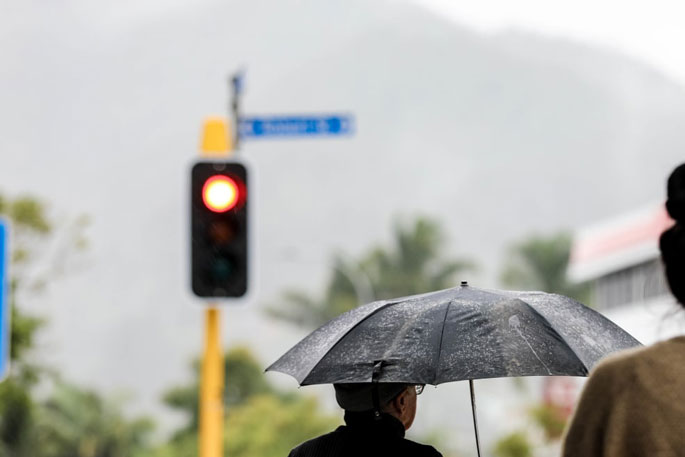The government's decision to scrap the Covid-19 Protection Framework is reasonable, but it is a mistake to drop mask mandates for public transport, an epidemiologist says.
As of midnight Monday, September 12, masks will only be required in health and aged care settings and household contacts do not have to isolate with cases if they return daily negative RAT results.
Auckland University epidemiologist professor Rod Jackson says it's a reasonable decision for now, but warns "it's the next variant we need to worry about".
"I think at the moment it's one of those decisions which is quite reasonable, because we still have a variant that vaccination and prime infection seem to protect against severe disease and death for the vast majority of people, so I think at the moment we're OK, but it's all about what the next variant looks like."
He told Checkpoint masks should continue to be used in confined spaces such as buses and planes.
"Those are settings where you're sitting right next to somebody and you don't know whether they've got Covid, they don't know whether they've got Covid, so that's a setting where I think we should have retained masks."
Jackson says he will still be wearing a mask in confined spaces, and encourages people to wear N95 masks - "that is incredibly protective for most of us".
He's not as concerned about large, ventilated indoor spaces as he is about public transport.
"I think that's a mistake, unless they have some information I don't have... on the buses I would be concerned, in confined spaces I would be concerned. So I'm going to make sure I'm wearing a high quality mask in those settings."
Those eligible should get their boosters because vaccination was a good defence against severe disease and death, he says.
University of Otago epidemiologist Professor Michael Baker agrees that a mask mandate should be retained for public transport.
"We need criteria to identify these high-risk situations, particularly those that are confined, crowded, and close-contact where people are regularly exposed," he says.
"On that basis, public transports would be an important environment for universal mask use, at least until we have sustained low Covid-19 transmission, which we have not yet reached."
Baker says there needs to be a framework to replace the traffic light system.
"Such a framework can provide a simple, meaningful way for describing the level of risk posed by Covid-19 and a proportionate response at each level.
"We have systems for categorising the risk from fires, storms, and earthquakes so this is a well-established approach to managing threats.
"We certainly know enough to have a science-based alert-level system for Covid-19 and other respiratory disease pandemics."
Baker says we could expect to Covid-19 to continue to evolve and generate further waves of infection that will require a coordinated response.
 Michael Baker Photo: RNZ / Samuel Rillstone.
Michael Baker Photo: RNZ / Samuel Rillstone.
University of Otago epidemiologist Dr Amanda Kvalsvig says the government needs to consider all New Zealanders when removing protection measures.
"Reduced measures mean that disabled and immune-compromised people will now be sharing public spaces with unmasked people who could be a household contact of a case and actively infectious."
Kvalsvig says with mask mandates ending, the need for excellent indoor air quality is important.
"Indoor ventilation and air filtration are now urgent public health priorities for New Zealand and the good news is, they really work.
"But without safe access to public spaces many disabled people will have to make choices no-one should have to make, between a lockdown - but this time, a private one with no endpoint - or taking on the risk of a life-changing or life-limiting infection."
What other political parties are saying
The Green Party says the decision to scrap the traffic light system will leave people wondering whether the government has given up responding to the Covid-19 pandemic.
Its spokesperson for Covid-19, Teanau Tuinono, says the near-complete removal of longstanding protections will be of considerable concern for immunocompromised and disabled people.
He says the focus must shift to slowing the spread of Covid-19 using long-term protective public health measures, alongside equal access to all future vaccines.
"The risk people face from long-Covid and the potential for new, more infectious variants hasn't changed," he says.
"The government must invest now in long-term protections. This is particularly vital for ensuring that our disabled and immunocompromised whānau can continue to go about their normal lives without putting their health at greater risk."
However, the ACT Party says our isolation rules for those who test positive are still too strict and should be changed.
ACT leader David Seymour says New Zealand's isolation rules are amongst the strictest in the world.
"No other jurisdiction requires seven days mandatory isolation for cases and household contacts. Jacinda Ardern needs to look to the rest of the world and change what are currently the world's most inflexible isolation rules.
"Keeping people locked in their houses longer than is necessary imposes real costs to them and the economy, without improving our Covid-19 response.
"We need a Covid-19 response that considered all the costs to New Zealanders' wellbeing as well as the benefits of fighting Covid-19 when putting controls in place."
Auckland Mayor Phil Goff says the government's decision reflects the significant reduction in risk posed by the virus due to rapidly falling infections.
"The traffic light system has helped Kiwis to manage the risk to themselves, their families, and our communities for nearly a year.
"However, with case numbers dropping steadily and most people having a level of protection due to vaccination and often partial immunity from prior infection, the time has come for New Zealanders to make their own assessment on measures they need to take to reduce the risk of catching Covid-19."
Goff says lifting restrictions brought New Zealand in line with other similar countries around the world. He hoped the change would further facilitate the movement of tourists, international students, and skilled migrants into New Zealand.
The business sector's response
Businesses have applauded the move, with Hospitality New Zealand saying it's the best news it's had for two and half years and will make all the difference to cafes and restaurants.
Business leader Kirk Hope says it's encouraging to the government is trusting individual firms to decide how they will limit the spread of the virus.
Alan McDonald from the Employer and Manufacturers Association says the move is symbolic as much as anything, as there has already been high non-compliance around mask-wearing.
"I think it's a really positive signal ... because it does kind of signal the end of the restrictions and the restraints we've been living under," he says.
"It's a bit hard to convince people we're open for business when you've still got orange restrictions on your international travellers."
He says the removal of mask mandates will be particularly welcomed in the hospitality and retail sectors.
"It'll be interesting to see if it actually encourages a few people to go back to work in the hospo and retail sectors, because they won't have to wear a mask all day."
While masks would no longer be required on Air New Zealand flights, the airline says customers would still be welcome to wear them and they will continue to be available.
However, masks may still be required on some outbound international flights depending on the individual jurisdiction the flight is arriving in, the airline says.
"While some customers and employees will welcome this news, it doesn't mean masks are disappearing forever. We really encourage customers to continue to do what makes them comfortable, which is the same message we're sharing with our employees," Air New Zealand spokesperson Leanne Geraghty says.
The airline has also reminded people they can get a credit until the end of the month if they decide they don't want to travel following the changes.



0 comments
Leave a Comment
You must be logged in to make a comment.